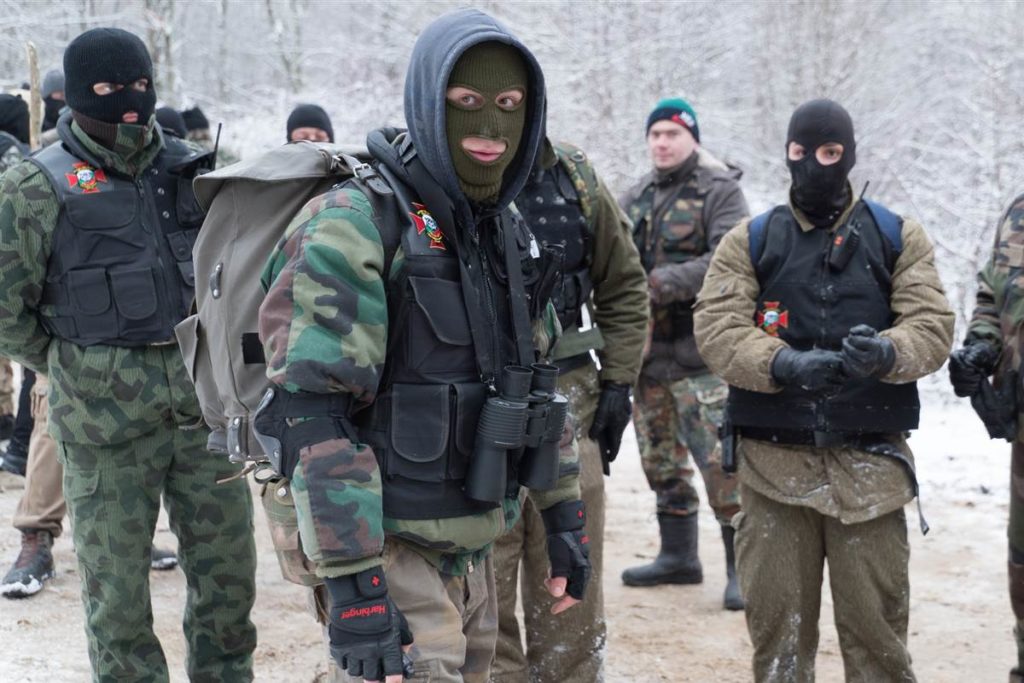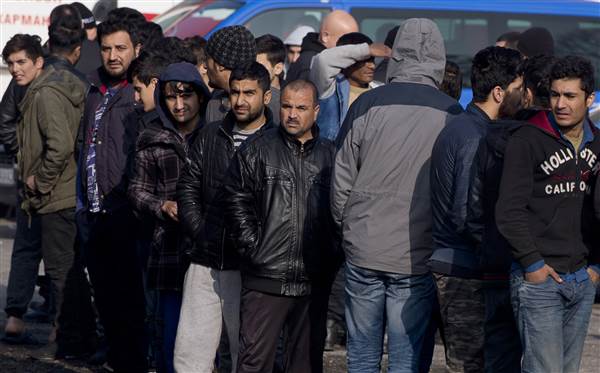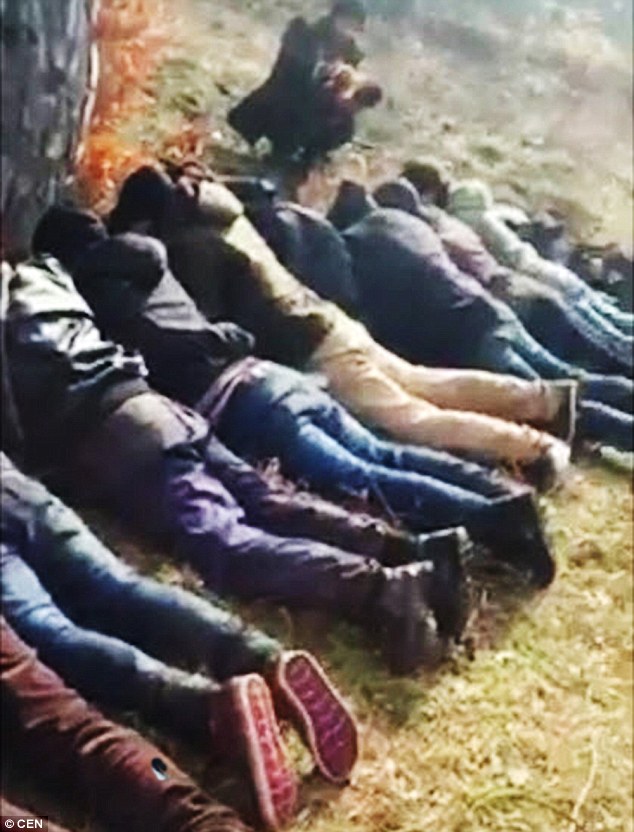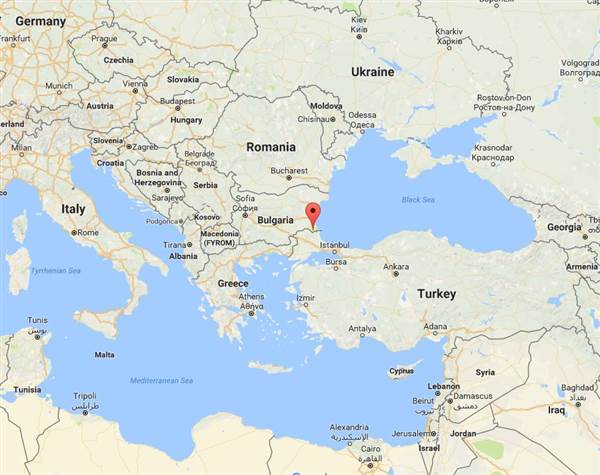Bulgarian Vigilantes Patrol Turkey Border to Keep Migrants Out
EUROPE, 13 Mar 2017

Members of BNO Shipka gather for a patrol near Bulgaria’s border with Turkey.
Mac William Bishop / NBC News
10 Mar 2017 — Figures in camouflage and ski masks gather at a fishing lodge. Many are armed with long knives, bayonets and hatchets.
The 35 men and women are on the hunt in Strandzha Massif, a forested mountain range on Bulgaria’s border with Turkey. Migrants trying to cross into Europe are their prey.
Patches on their irregular uniforms — a coat of arms bearing a snarling wolf’s head framed by Cyrillic text — proclaim them to be members of the Bulgarian National Movement Shipka, abbreviated in Bulgarian as “BNO Shipka.”
Members of the paramilitary organization form into ranks as their leader, Vladimir Rusev, speaks. A former colonel who says he fought in Chechnya as a volunteer alongside Russians, Rusev declares his support for a man they admire: President Donald Trump.
“The CIA is trying to undermine Trump,” said Rusev, a compact 58-year-old with a neat mustache and short-cropped hair. “They want to destroy him. We offer our support to him.”
Trump’s hard-line stance on immigration and vocal criticism of Islam finds an appreciative audience here.
Most BNO Shipka members are friendly, courteous and open. The organization’s website projects a different message: slick videos replete with firearms and military training, and declarations that Europe must be defended against Islam.
Rusev claims they have as many as 50,000 members, although NBC News was unable to verify this number.
“I’m not nationalistic or anything like that. I’m just a patriot,” said Nikolai Ivanov, a 34-year-old who was one of the group’s founding members in 2014.
“Many of these immigrants are not just some guys who are trying to run away from war. They are from age 17 to 35, with good physiques and training,” Ivanov added. “It’s not a problem that they are Muslims. The problem is it’s a different civilization. They don’t think like us, they have a totally different view about life, about everything.”
While the group has been criticized by human rights advocates, it isn’t hard to find people who agree with Ivanov’s views in Bulgaria. The head of the country’s border police praised a nationalist volunteer group for intercepting migrants in April.
Rust Belt of the Balkans
Bulgaria occupies a place at the seams. Looking east, this Eastern Orthodox crossroads shares a traditional alliance with Russia. To the south is Turkey, once home to a Muslim empire that for centuries dominated the region. The European Union, with liberal values and a promise of wealth, lies to the west.
Since the end of the Cold War, Bulgaria has firmly embraced the West — joining NATO in 2004 and the EU in 2007. But the rapid rise in living standards for its seven million citizens stalled during the financial crisis of 2007-2008. Now, average annual income remains the lowest in the EU, even when measured by purchasing power.
In the Soviet era, heavy industry and chemical production dominated the economy. Now, abandoned factories litter a landscape replete with decaying smokestacks and depopulated villages.
On top of this, Bulgaria has become a major overland route as Europe grapples with a migration crisis due to its borders with Turkey, Greece, Macedonia, Serbia and Romania.
According to Eurostat, 20,165 people applied for asylum in Bulgaria in 2015, the most recent year for which firm numbers were available. This was a fraction of the around 1.2 million who claimed asylum in the EU that year, more than three quarters of whom were from majority Muslim countries.
Although only a handful of Europe-bound migrants have settled in Bulgaria, concern about the newcomers resonates in a country that was dominated for centuries by the Ottoman Turks.
Ivanov believes the refugee crisis was part of a plan in which ISIS militants would slip into the country and attack. Then, neighboring Turkey would deploy troops to Bulgaria under the auspices of the NATO alliance, he said, effectively reclaiming a portion of the lost Ottoman Empire.
Conspiracy theories like this abound among BNO Shipka members, some of whom make a point of speaking Russian. Their affinity for Moscow is perhaps understandable in the context of Bulgaria’s unhappy history with its Muslim-majority neighbor. Shipka, after all, refers to a battle in which a Russo-Bulgarian force defeated the Ottoman Turks in 1877.
Bulgaria’s weak economy and status outside the borderless Schengen area means most migrants aim for Greece as a gateway to more prosperous countries further west.

Migrants line up to buy food at Bulgaria’s Harmanli refugee center, which is located near the border with Turkey, on Nov. 25. Nikolay Doychinov / AFP – Getty Images
So the “refugee situation here is not that serious,” said Krassimir Kanev, a founder of the human rights group Bulgarian Helsinki Committee. “Bulgaria is a transit country, the refugees want to move to [other] EU countries.”
However, Bulgaria “registered 31,281 new arrivals in 2015, which represents 89.3 percent of all land arrivals in the EU for the same year,” according to a report by Radoslav Stamenkov, the head of the Bulgaria office at the International Organization for Migration. The “migration shock” that began in 2013 created social tensions “in a country that had a very limited experience of receiving migrants,” Stamenkov wrote.
Kanev sees BNO Shipka and similar groups as xenophobic nationalists at best, or at worst, violent and racist extremists. In October 2015, an Afghan migrant was shot and killed when he tried to cross into Bulgaria. In November, protests by locals over rumors of disease forced the temporary closure of the country’s largest refugee camp and led to riots.
“There are ongoing criminal proceedings against a number of these groups,” Kanev said. Bulgarian vigilantes have detained migrants and tied them up, sometimes beating and humiliating them before forcing them back across the border, he added.
Asked for its position on vigilante groups, Bulgaria’s Interior Ministry did not respond.
Jokes and Cigarettes
Back in the forests of the Strandzha Massif, BNO Shipka is going out on patrol. In bitter cold and with snow on the ground, this isn’t the high season for refugees crossing from Turkey. Some still try.
After a series of short speeches by leaders, members gear up and head toward the border. But the presence of a large group of people in ski masks and military regalia dashing from cover to cover in view of the highway attracts the attention of local authorities.
Two border police officers, accompanied by several soldiers armed with assault rifles, drive up in four-by-fours and ask for an explanation. They seem less concerned than confused. Most BNO Shipka members wear Bulgarian military fatigues from their own service so the groups merge, trading jokes and cigarettes. Only the slung rifles indicate who is an active soldier and who is a vigilante.
The authorities seem unsure what to do, particularly with members of the media present.
A BNO Shipka squad leader informs journalists that police are letting them continue, but the training mission has been completed and the team will return to the fishing lodge. As the group marches back, police follow them having called in reinforcements.
No one is detained or questioned further, but police return the following day.
Undeterred, BNO Shipka members record a video message to Trump. They put on snow camouflage oversuits and sneak around police stationed at the road leading to the lodge.
Asked if he is afraid Bulgaria is losing its identity, founding member Ivanov nods. “If we don’t do something soon,” he said. “It’s not just Bulgaria, but all of Europe.”
BNO Shipka didn’t catch any migrants this time. Still, they intend to keep looking.
DISCLAIMER: The statements, views and opinions expressed in pieces republished here are solely those of the authors and do not necessarily represent those of TMS. In accordance with title 17 U.S.C. section 107, this material is distributed without profit to those who have expressed a prior interest in receiving the included information for research and educational purposes. TMS has no affiliation whatsoever with the originator of this article nor is TMS endorsed or sponsored by the originator. “GO TO ORIGINAL” links are provided as a convenience to our readers and allow for verification of authenticity. However, as originating pages are often updated by their originating host sites, the versions posted may not match the versions our readers view when clicking the “GO TO ORIGINAL” links. This site contains copyrighted material the use of which has not always been specifically authorized by the copyright owner. We are making such material available in our efforts to advance understanding of environmental, political, human rights, economic, democracy, scientific, and social justice issues, etc. We believe this constitutes a ‘fair use’ of any such copyrighted material as provided for in section 107 of the US Copyright Law. In accordance with Title 17 U.S.C. Section 107, the material on this site is distributed without profit to those who have expressed a prior interest in receiving the included information for research and educational purposes. For more information go to: http://www.law.cornell.edu/uscode/17/107.shtml. If you wish to use copyrighted material from this site for purposes of your own that go beyond ‘fair use’, you must obtain permission from the copyright owner.

